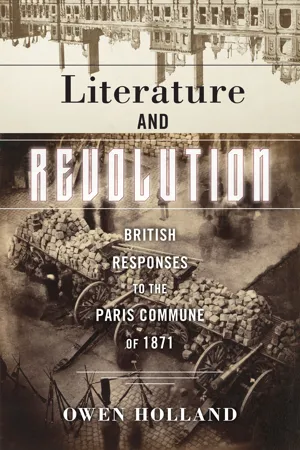
- 240 pages
- English
- ePUB (mobile friendly)
- Available on iOS & Android
eBook - ePub
About this book
Between March and May 1871, the Parisian Communards fought for a revolutionary alternative to the status quo grounded in a vision of internationalism, radical democracy and economic justice for the working masses that cut across national borders. The eventual defeat and bloody suppression of the Commune resonated far beyond Paris. In Britain, the Commune provoked widespread and fierce condemnation, while its defenders constituted a small, but vocal, minority. The Commune evoked long-standing fears about the continental 'spectre' of revolution, not least because the Communards' seizure of power represented an embryonic alternative to the bourgeois social order.
This book examines how a heterogeneous group of authors in Britain responded to the Commune. In doing so, it provides the first full-length critical study of the reception and representation of the Commune in Britain during the closing decades of the nineteenth century, showing how discussions of the Commune functioned as a screen to project hope and fear, serving as a warning for some and an example to others. Writers considered in the book include John Ruskin, Edward Bulwer-Lytton, Eliza Lynn Linton, Mary Elizabeth Braddon, Anne Thackeray Ritchie, Margaret Oliphant, George Gissing, Henry James, William Morris, Alfred Austin and H.G. Wells. As the book shows, many, but not all, of these writers responded to the Commune with literary strategies that sought to stabilize bourgeois subjectivity in the wake of the traumatic shock of a revolutionary event. The book extends critical understanding of the Commune's cultural afterlives and explores the relationship between literature and revolution.
This book examines how a heterogeneous group of authors in Britain responded to the Commune. In doing so, it provides the first full-length critical study of the reception and representation of the Commune in Britain during the closing decades of the nineteenth century, showing how discussions of the Commune functioned as a screen to project hope and fear, serving as a warning for some and an example to others. Writers considered in the book include John Ruskin, Edward Bulwer-Lytton, Eliza Lynn Linton, Mary Elizabeth Braddon, Anne Thackeray Ritchie, Margaret Oliphant, George Gissing, Henry James, William Morris, Alfred Austin and H.G. Wells. As the book shows, many, but not all, of these writers responded to the Commune with literary strategies that sought to stabilize bourgeois subjectivity in the wake of the traumatic shock of a revolutionary event. The book extends critical understanding of the Commune's cultural afterlives and explores the relationship between literature and revolution.
Frequently asked questions
Yes, you can cancel anytime from the Subscription tab in your account settings on the Perlego website. Your subscription will stay active until the end of your current billing period. Learn how to cancel your subscription.
No, books cannot be downloaded as external files, such as PDFs, for use outside of Perlego. However, you can download books within the Perlego app for offline reading on mobile or tablet. Learn more here.
Perlego offers two plans: Essential and Complete
- Essential is ideal for learners and professionals who enjoy exploring a wide range of subjects. Access the Essential Library with 800,000+ trusted titles and best-sellers across business, personal growth, and the humanities. Includes unlimited reading time and Standard Read Aloud voice.
- Complete: Perfect for advanced learners and researchers needing full, unrestricted access. Unlock 1.4M+ books across hundreds of subjects, including academic and specialized titles. The Complete Plan also includes advanced features like Premium Read Aloud and Research Assistant.
We are an online textbook subscription service, where you can get access to an entire online library for less than the price of a single book per month. With over 1 million books across 1000+ topics, we’ve got you covered! Learn more here.
Look out for the read-aloud symbol on your next book to see if you can listen to it. The read-aloud tool reads text aloud for you, highlighting the text as it is being read. You can pause it, speed it up and slow it down. Learn more here.
Yes! You can use the Perlego app on both iOS or Android devices to read anytime, anywhere — even offline. Perfect for commutes or when you’re on the go.
Please note we cannot support devices running on iOS 13 and Android 7 or earlier. Learn more about using the app.
Please note we cannot support devices running on iOS 13 and Android 7 or earlier. Learn more about using the app.
Yes, you can access Literature and Revolution by Owen Holland in PDF and/or ePUB format, as well as other popular books in History & French History. We have over one million books available in our catalogue for you to explore.
Information
Publisher
Rutgers University PressYear
2022Print ISBN
9781978821934, 9781978829855eBook ISBN
9781978821941Table of contents
- Cover
- Series Page
- Title Page
- Copyright
- Contents
- Preface
- 1. Introduction: A Commune in Literature
- 2. Refugees, Renegades, and Misrepresentation: Edward Bulwer Lytton and Eliza Lynn Linton
- 3. Dangerous Sympathies: Mary Elizabeth Braddon, Anne Thackeray Ritchie, and Margaret Oliphant
- 4. “Dreams of the Coming Revolution”: George Gissing’s Workers in the Dawn
- 5. Revolution and Ressentiment: Henry James’s The Princess Casamassima
- 6. The Uses of Tragedy: Alfred Austin’s The Human Tragedy and William Morris’s The Pilgrims of Hope
- 7. “It Had to Come Back”: H. G. Wells’s When the Sleeper Wakes
- 8. Conclusion: Looking without Seeing
- Acknowledgments
- Notes
- Bibliography
- Index
- About the Author